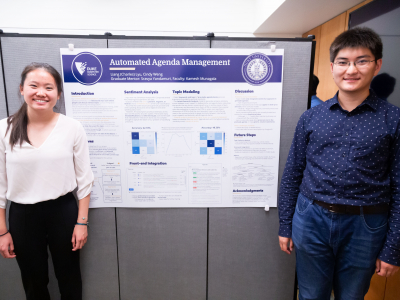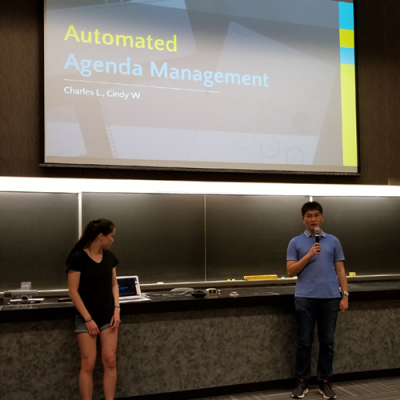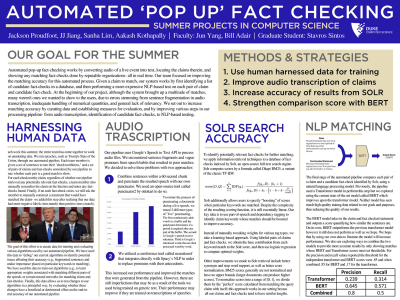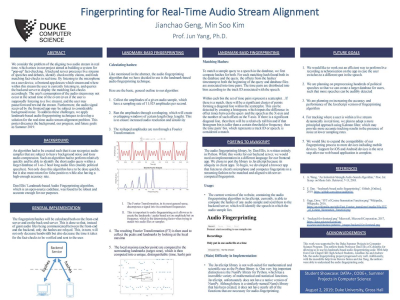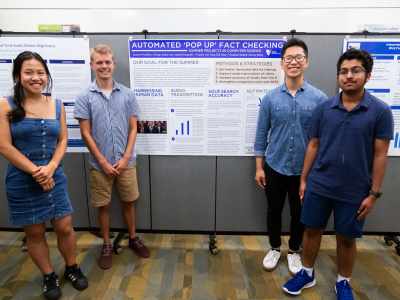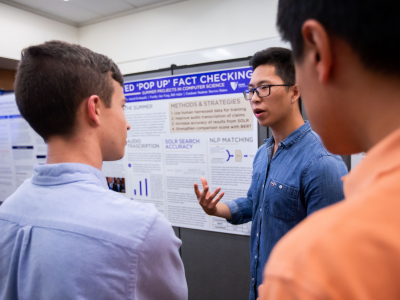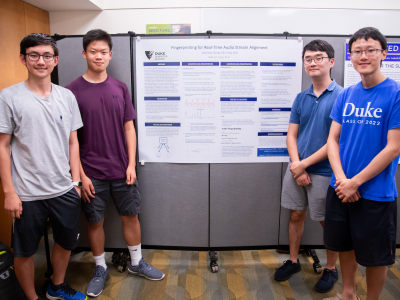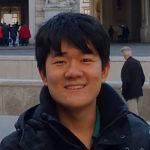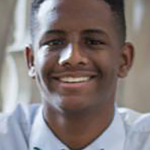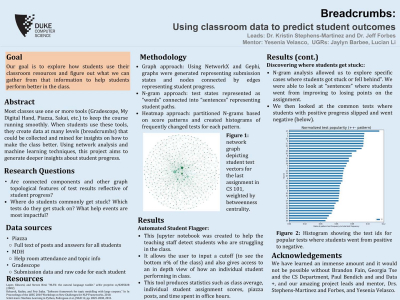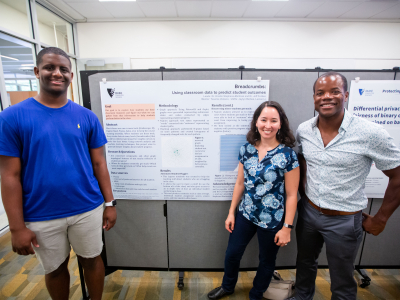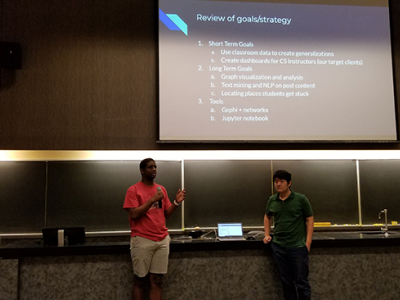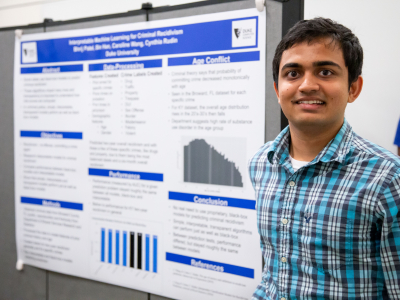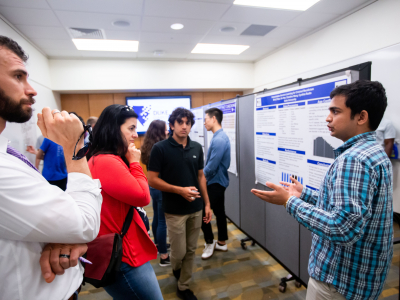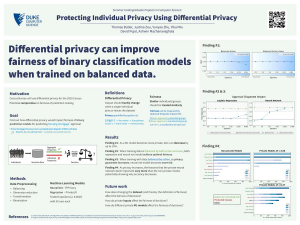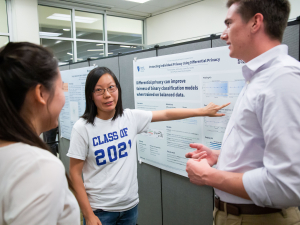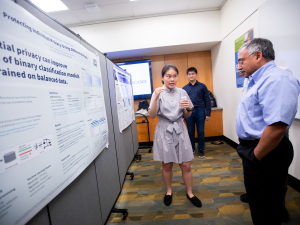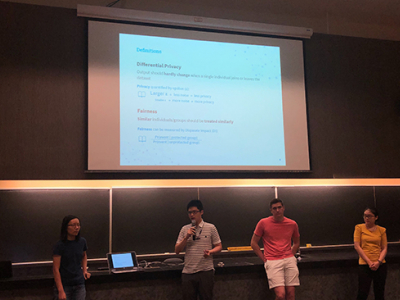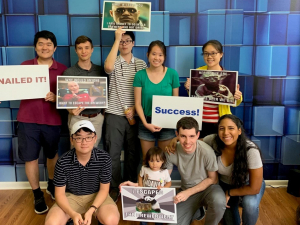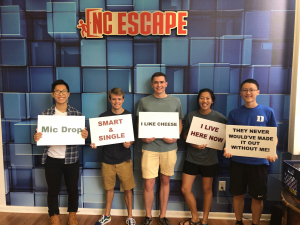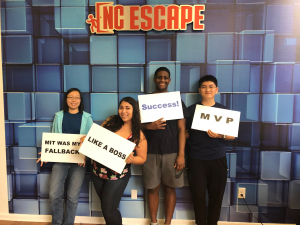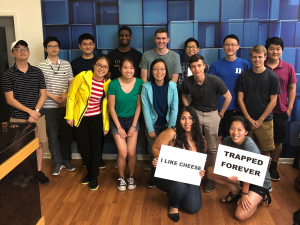In collaboration with graduate students, political scientists, and computer scientists at Duke and Stanford, a team of students built a video chat platform for groups of people to converse on a topic of civic interest, such as immigration policy or electoral reform at a national level, or more narrowly defined topics at a local or corporate level. The ultimate goal was to deploy the platform on a large scale to perform civic discourse and help with societal decision making. The main challenge with scaling such a platform is moderating the conversation and making sure it follows an agenda.
The prototype of the platform builds on Twilio, and dynamically generates transcripts of the conversation using the Google speech to text API. Students built software to use these transcripts to perform dynamic moderation, specifically including AI tools to detect if the conversation is following the agenda. The project was fast-moving, and students may continue to use the transcripts to perform other moderation tasks. Students collaborated with a team of graduate students at Duke and Stanford to think through the machine learning tools, Javascript, and API integration needed, and how to implement them.
Leader: Kamesh Munagala
Participating Students
Charles Lyu
Hi! I'm Charles, a rising junior majoring in Computer Science and Math. I'm from China, or if you're interested in a more precise location, a small city between Beijing and Shanghai (as I always tell others). I'm working on a project with Prof Munagala this summer as I've always been interested in real-life applications of algorithms and other aspects of theoretical CS. Feel free to say hi if you see me around in LSRC!
Cindy Weng
Poster
Our undergraduate summer program concluded August 2, 2019 with a research showcase and projects fair which featured posters demonstrating what our students have been doing all summer.
|
|
|
Presentations
On July 19 at the end of week 7 of their 10-week summer program developing research projects with computer science faculty, students presented their results to date. The audience was comprised of about 100 people, including students and mentors from Data+, Code+, and SUPICS, the summer undergraduate projects in computer science. Here, Cindy Weng presents with her teammate Charles Lyu on their summer project developing tools for automated agenda management for democratic deliberation using artificial intelligence.
Our society is struggling with an unprecedented amount of falsehoods, hyperboles, and half-truths that do harm to democracy, health, economy, and national security. Fact-checking is a vital defense against this onslaught, perhaps now more than ever. Despite the rise of fact-checking efforts globally, fact-checkers find themselves increasingly overwhelmed and their messages difficult to reach some segments of the public. Our overall project seeks to leverage the power of data and computing to help make fact-checking and dissemination of fact-checks to the public more effective, scalable, and sustainable.
In particular, this summer team supported scalable “pop-up” fact-checking, which in real-time identifies checked claims while media streams, social network feeds, and website contents are being consumed. The team tackled the challenges that arise in deploying the system for live events and scaling it up to a large number of concurrent users. Some specific ideas included audio fingerprinting to identify live events being watched, aggregating live usage data to identify new check-worthy claims, and a subscription service to notify users as soon as a previously encountered claim is checked.
Leader: Jun Yang
Participating Students
Min Soo Kim
Hometown: Irvine, California. Major: Computer Science / Japanese. Pop-up fact checking seems extremely relevant in today's society and I hope to make some difference. After graduating, I hope I can get a job developing software.
JJ Jiang
JJ is from Toronto, Canada with the tentative, unofficial majors of Economics, Psychology and Sociology. She hopes to study the intersection of business, technology and society. She is interested in this project because of it explores the role of technology as service.
Sanha Lim
Jack Proudfoot
Hi, I'm Jack! I'm an ECE/CS major from Hunterdon, NJ. Growing up I had a very active imagination and I loved to spend my free time reading books and playing with legos. I also really enjoyed school and particularly enjoyed the activities that encouraged creative problem solving. Although I didn't realize it at the time, when I was introduced to computer programming in middle school I was given an avenue to further explore the same types of creative problem solving that I loved as a young kid. Throughout middle school and high school I developed a passion for computer science that led me to want to study it in college. I hope that through my project this summer I can put my experience towards solving a real issue in the world and I hope that I am presented with similar opportunities throughout the rest of my time at Duke and beyond.
Frank Geng
Hi all! I am Frank Geng, an international student from Nanjing, China. I am a rising sopophore intending to double major in Computer Science and Statistics. The Code+ program allows me to dive deeper into things I like during the summer and meet people of similar interests. In Code+ and future study at Duke, I wish I can gain more experience in doing projects and implement coding skills to solve real-world problems. This goal will also guide me through future careers. Can't wait to see you all in summer!
Posters
Our undergraduate summer program concluded August 2, 2019 with a research showcase and projects fair which featured posters demonstrating what our students have been doing all summer.
Presentations
On July 19 at the end of week 7 of their 10-week summer program developing research projects with computer science faculty, students presented their results to date. The audience was comprised of about 100 people, including students and mentors from Data+, Code+, and SUPICS, the summer undergraduate projects in computer science. Below, JJ Jiang presents with her teammates (from left to right: Jack Proudfoot, Sanha Lim, and Frank Gang) on their summer project building scalable techniques for fact-checking real time speech.
Most classes use one or more tools (Gradescope, My Digital Hand, Piazza, Sakai, etc.) to keep the course running smoothly. When students use these tools, they create data at many levels (breadcrumbs) that could be collected and mined for insights on how to make the class better.
Students were involved in formulating questions, analyzing data, and drawing conclusions. Some specific questions we sought to answer using this data included: How do students use office hours? Are there clear trends that can be predicted and thus change how UTAs are allocated to reduce office hour wait time? How do students seek help on all the available support resources? Does some support help students more than others? Could we use those insights to create a recommender system for students, so they get better help more quickly? What are the predictors of success in the class? Could those predictors be influenced, so more students are successful in the class?
Leaders: Kristin Stephens-Martinez, Jeff Forbes
Participating Students
Lucian Li
Lucian is a rising senior from Houston, TX pursuing a double major in history and computer science. He is interested in understanding the use of technology in enhancing education, as well as how computer technologies are changing the experience of teachers and students. Next year, he will be composing his senior thesis in history, and he will be pursuing graduate education after graduation.
Jaylyn Barbee
I am Jaylyn Barbee from Durham, NC, majoring in Computer Science and graduating in 2021. I one day hope to be a software engineer, working on problem that will change the world, but for now I enjoy playing video games, watching YouTube and cooking. This project caught my eye because I am going to be a part of the data we will be exploring. Hopefully through this we can find better ways, as students, to take advantage of our resources.
Poster
Our undergraduate summer program concluded August 2, 2019 with a research showcase and projects fair which featured posters demonstrating what our students have been doing all summer.
Project Materials
- Undergraduate Researchers: Jaylyn Barbee, Lucian Li
- Mentor: Yesenia Velasco
- Leads: Dr. Kristin Stephens-Martinez and Dr. Jeff Forbes
Presentations
On July 19 at the end of week 7 of their 10-week summer program developing research projects with computer science faculty, students presented their results to date. The audience was comprised of about 100 people, including students and mentors from Data+, Code+, and SUPICS, the summer undergraduate projects in computer science. Below, Jaylyn Barbee presents with his teammate Lucian Li on their summer project analyzing fine grained data from introductory CS courses to learn how to best improve student learning.
In this project, students developed interpretable machine learning tools that can help with human tasks spanning everything from decision making to art. They studied multiple tasks in interpretable machine learning using methods that can incorporate domain-based constraints and other types of domain knowledge using efficient discrete optimization techniques and Bayesian hierarchical modeling. Students created open source software derived from theoretical insight into specific domain problems.
The tasks for this summer included:
- Create computer generated poetry: incorporate semantic meaning into computer generated poetry.
- De-noise low-resolution images: how to upsample a low resolution image while maintaining a high signal to noise ratio.
- Provide interpretable image recognition: use neural nets to dissect images into prototypical parts for interpretable image classification, for applications in medicine and beyond.
Participating Students
McCourt Hu
I am from Dalian China and majoring in CS and statistics. I am working with prof Cynthia Rudin on super resolution this summer and hope to enjoy my last year at Duke and go to graduate school after graduation.
Sachit Menon
Hi! My name is Sachit; I’m a student at Duke University studying math and computer science as an A.B. Scholar. My primary interests lie in deep learning and AI more generally (both fundamentals and applications, in that order). I’m particularly interested in unsupervised learning, especially representation learning and generative modeling. This summer, I'll be working on a project on image super-resolution, or the conversion of images from low resolutions to higher resolutions, via deep learning -- think 'zoom and enhance' from CSI, but real! I’m especially excited about this project as it presents an area where unsupervised methods have a clear, direct use case. In the future, I hope to pursue a PhD in machine learning, ideally centered around advancing unsupervised/semi-supervised methods and their application to tasks in supervised and reinforcement learning.
Bhrij Patel
My name is Bhrij Patel, a rising sophomore. I am from Cary, North Carolina and intending to double major in Math and Computer Science. I am interested in my project for machine learning because I am interested in learning the various applications of it with different models. After Duke, I hope to go to some form of graduate school and go further into the field of data analytics.
Poster
The undergraduate summer program concluded August 2, 2019 with a research showcase and projects fair which featured posters demonstrating what our students have been doing all summer.
Data scientists in a number of fields including medicine, internet of things, and social science, routinely gather and analyze individual-level data. These data span every aspect of our lives and, thus, could breach our privacy by revealing medical diagnoses, sexual orientation, race and other sensitive properties about us. Differential privacy is a principled approach for data analysis with provable guarantees of privacy for individuals.
In this summer project, student teams built usable interfaces to sensitive datasets through which users can query and analyze the sensitive data (medical and location trajectories) while satisfying differential privacy using state of the art differentially private algorithms.
Participating Students
Yikai Wu
I am a rising junior from China, majoring in computer science and physics. I have been working with Prof. Machanavajjhala throughout the year on differential privacy. I find it an interesting topic as it involves database analysis and algorithmic design with a variety of mathematical techniques. In the future, I would like to pursue a PhD in computer science and hopefully become a professor or a researcher.
Justina Zou
I'm majoring in Statistical Science, and I'm interested in my summer project because I want to learn more about how to protect privacy using computer science and statistics. In the future, I hope to learn more about the intersection of statistics, math, and computer science and how they can be used to solve challenging problems.
Thomas Butler
I am a first year CS major from Richmond, VA. I am interested in this summer project because it gives us an opportunity to provide researchers at Duke with important health data while allowing the subject individuals to maintain their privacy. While our health data can help researchers make important breakthroughs, it is equally, if not more, important that subjects can stay anonymous. My hope is to graduate with a concentration in Software Systems and continue to work with researchers and data firms to provide users privacy in an age where so much is in the public domain.
Yunyao Zhu
A native of Shanghai, China, Yunyao is a rising sophomore majoring in Computer Science. Interested in the intersection of ethics and technology, she is excited to learn more about the techniques that protect individual privacy. She hopes to continue learning and applying technology for social good both at Duke and beyond graduation.
Poster
Our undergraduate summer program concluded August 2, 2019 with a research showcase and projects fair which featured posters demonstrating what our students have been doing all summer.
Presentations
On July 19 at the end of week 7 of their 10-week summer program developing research projects with computer science faculty, students presented their results to date. The audience was comprised of about 100 people, including students and mentors from Data+, Code+, and SUPICS, the summer undergraduate projects in computer science. Below, Yikai Wu presents with his teammates (from left to right: Justina Zou, Thomas Butler, and Yunyao Zhu) on their summer project studying differential privacy in data analysis.
As a team-building exercise outside of the classroom and just for fun, 2019 undergrad researchers enjoyed the challenge of an escape room activity over the summer. Participants had the opportunity to work together to solve the escape room's mystery and get to know each other in the process. The group also enjoyed bowling.


